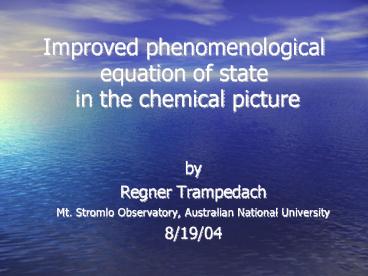Improved%20phenomenological%20equation%20of%20state%20in%20the%20chemical%20picture
Title: Improved%20phenomenological%20equation%20of%20state%20in%20the%20chemical%20picture
1
Improved phenomenological equation of state in
the chemical picture
- by
- Regner Trampedach
- Mt. Stromlo Observatory, Australian National
University - 8/19/04
2
The Holistic Star
- ...from the convective, radiatively cooled
surface layers - ...to the relativistically degenerate core
- All observations are of the photosphere
- Photosphere is boundary condition of star
- All observed p-/g-modes go through the surface
layers
3
The Dynamic Sun
4
Vertical Temperature cut of? -Boo
5
Spectroscopy with simulations
- No micro-/macro-turbulence
- Assymetric lines
- gt proper recog-nition of NiI-blend
- Lower OI abund
- Agreement btw. OI, OI and OH
6
Input Physics
- Equation of State (EOS)
- Pressure for hydro-static support
- Response to temperature-/density-changes
- Opacity ff bf bb CIA
- radiative transfer gt
- radiative heating qrad,? ?? ? (J?-S? )
7
Equation of StateTwo main purposes
- Thermodynamic properties of plasma
- Pressure, internal energy
- Adiabatic exponent
- Foundation of opacity calculations
- ionization and dissociation balances
- population of electronic- and roto-vibrational-sta
tes
8
The OP/MHD- and OPAL-projects
- Prompted by a plea by Simon (1982)
- Pulsations by? -mechanism didnt agree with
observations - Substantial disagreement with helioseismic
structure of the Sun
9
MHD Equation of State
- Explicitly includes hundreds of energy-levels for
each ion/atom/molecule - Use occupation probabilities, wi, to account for
destruction of states from collisions with
other particles
10
Micro-field Distributions
- Ionization by fluctuating fields from passing
ions/electrons - With a state, i, being destroyed by a field of
critical strength, Fcr, the probability of it
surviving is
wi Q(Fcr ) ?0Fcr P(F
)dF - Changed from linear fit to Q-MHD, Nayfonov,
Däppen, Hummer Mihalas (1999).
11
Micro-Field Effects in the Sun
___ OPAL ___ MHD2000 - - old Q (Fcd)
12
Quantum effects
- Quantum diffractionfrom Heisenbergsuncertainty
relation
- Exchange interactionfrom Paulis
exclusionprinciple
13
Exchange Interactions in the Sun
___ OPAL ___ MHD2000 - - no Exch
14
Interaction with Neutral Particles
- Original MHD used hard-sphere interacts.
- How do hard spheres interact?
- Through electric forces, of course...
- Assume Gaussian (s-orbital) r2e-r/ra
e--distribution.
15
Effective charges in the Sun
___ OPAL ___ MHD2000 - - const. Z
16
Coulomb Interactions
- The 1st order term is the Debye-Hückel term
FDH/(NkT) --? /3 . - Including this, was the largest improvement over
earlier work. - Results in negative Ftot for large ? !!!
- MHD included a t -factor to avoid this.
- Include higher-order terms by factor g(? ).
17
(No Transcript)
18
Coulomb Interactions in the Sun
___ OPAL ___ MHD2000 - - Debye-H
19
Additional Changes
- Relativistic effects affects stellar centres
- The Sun has a relativistically degenerate core
- well, - at least slightly...
- Molecules
- 315 di-atomic and 99 poly-atomic ( ions)
- Affects stellar atmospheres and the convection
simulations
20
Opacity According to OP
21
Confronting Experiment
- From Nahar, S. N., 2003, Phys. Rev. A (submitted)
22
Summary
- Developed new equation of state
- With larger range of validity
- More complete physics
- Will change Solar "standard" model
...might help reconcile low C,N,O Sun with
helioseismology... - Haven't included crystallization
- - yet
23
Prospects for the Future
- Calculate tables of MHD2000
- Use it as basis for new opacity calculation using
the newest cross-section data - Implement a new radiative transfer scheme in the
convection simulations - Build a grid of convection models, using the new
EOS, opacities and radiative transfer scheme

